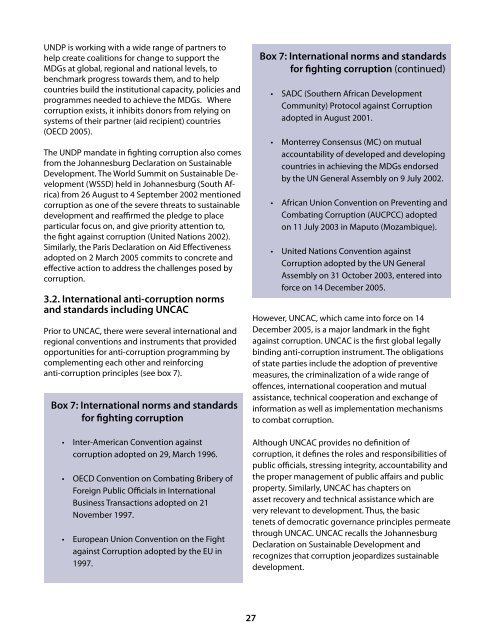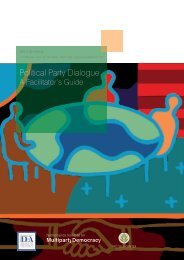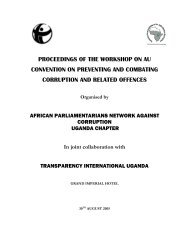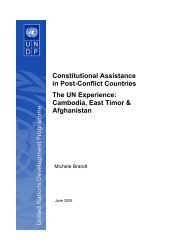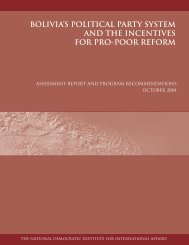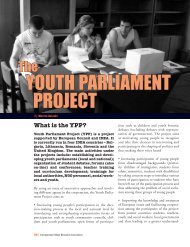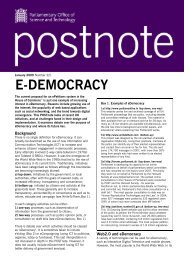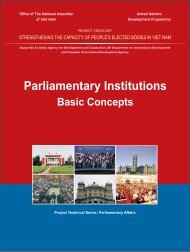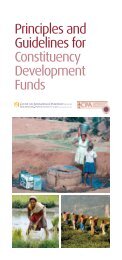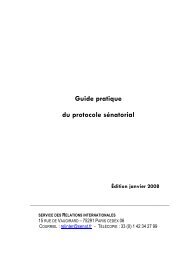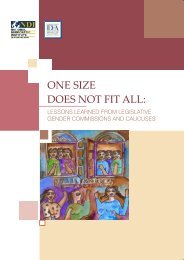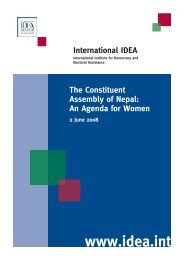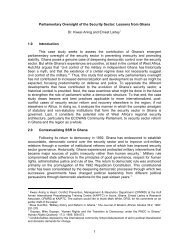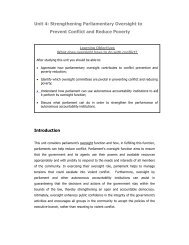Corruption and Development - pogar
Corruption and Development - pogar
Corruption and Development - pogar
Create successful ePaper yourself
Turn your PDF publications into a flip-book with our unique Google optimized e-Paper software.
UNDP is working with a wide range of partners to<br />
help create coalitions for change to support the<br />
MDGs at global, regional <strong>and</strong> national levels, to<br />
benchmark progress towards them, <strong>and</strong> to help<br />
countries build the institutional capacity, policies <strong>and</strong><br />
programmes needed to achieve the MDGs. Where<br />
corruption exists, it inhibits donors from relying on<br />
systems of their partner (aid recipient) countries<br />
(OECD 2005).<br />
The UNDP m<strong>and</strong>ate in fighting corruption also comes<br />
from the Johannesburg Declaration on Sustainable<br />
<strong>Development</strong>. The World Summit on Sustainable <strong>Development</strong><br />
(WSSD) held in Johannesburg (South Africa)<br />
from 26 August to 4 September 2002 mentioned<br />
corruption as one of the severe threats to sustainable<br />
development <strong>and</strong> reaffirmed the pledge to place<br />
particular focus on, <strong>and</strong> give priority attention to,<br />
the fight against corruption (United Nations 2002).<br />
Similarly, the Paris Declaration on Aid Effectiveness<br />
adopted on 2 March 2005 commits to concrete <strong>and</strong><br />
effective action to address the challenges posed by<br />
corruption.<br />
3.2. International anti-corruption norms<br />
<strong>and</strong> st<strong>and</strong>ards including UNCAC<br />
Prior to UNCAC, there were several international <strong>and</strong><br />
regional conventions <strong>and</strong> instruments that provided<br />
opportunities for anti-corruption programming by<br />
complementing each other <strong>and</strong> reinforcing<br />
anti-corruption principles (see box 7).<br />
Box 7: International norms <strong>and</strong> st<strong>and</strong>ards<br />
for fighting corruption<br />
• Inter-American Convention against<br />
corruption adopted on 29, March 1996.<br />
• OECD Convention on Combating Bribery of<br />
Foreign Public Officials in International<br />
Business Transactions adopted on 21<br />
November 1997.<br />
• European Union Convention on the Fight<br />
against <strong>Corruption</strong> adopted by the EU in<br />
1997.<br />
Box 7: International norms <strong>and</strong> st<strong>and</strong>ards<br />
for fighting corruption (continued)<br />
• SADC (Southern African <strong>Development</strong><br />
Community) Protocol against <strong>Corruption</strong><br />
adopted in August 2001.<br />
• Monterrey Consensus (MC) on mutual<br />
accountability of developed <strong>and</strong> developing<br />
countries in achieving the MDGs endorsed<br />
by the UN General Assembly on 9 July 2002.<br />
• African Union Convention on Preventing <strong>and</strong><br />
Combating <strong>Corruption</strong> (AUCPCC) adopted<br />
on 11 July 2003 in Maputo (Mozambique).<br />
• United Nations Convention against<br />
<strong>Corruption</strong> adopted by the UN General<br />
Assembly on 31 October 2003, entered into<br />
force on 14 December 2005.<br />
However, UNCAC, which came into force on 14<br />
December 2005, is a major l<strong>and</strong>mark in the fight<br />
against corruption. UNCAC is the first global legally<br />
binding anti-corruption instrument. The obligations<br />
of state parties include the adoption of preventive<br />
measures, the criminalization of a wide range of<br />
offences, international cooperation <strong>and</strong> mutual<br />
assistance, technical cooperation <strong>and</strong> exchange of<br />
information as well as implementation mechanisms<br />
to combat corruption.<br />
Although UNCAC provides no definition of<br />
corruption, it defines the roles <strong>and</strong> responsibilities of<br />
public officials, stressing integrity, accountability <strong>and</strong><br />
the proper management of public affairs <strong>and</strong> public<br />
property. Similarly, UNCAC has chapters on<br />
asset recovery <strong>and</strong> technical assistance which are<br />
very relevant to development. Thus, the basic<br />
tenets of democratic governance principles permeate<br />
through UNCAC. UNCAC recalls the Johannesburg<br />
Declaration on Sustainable <strong>Development</strong> <strong>and</strong><br />
recognizes that corruption jeopardizes sustainable<br />
development.<br />
27


